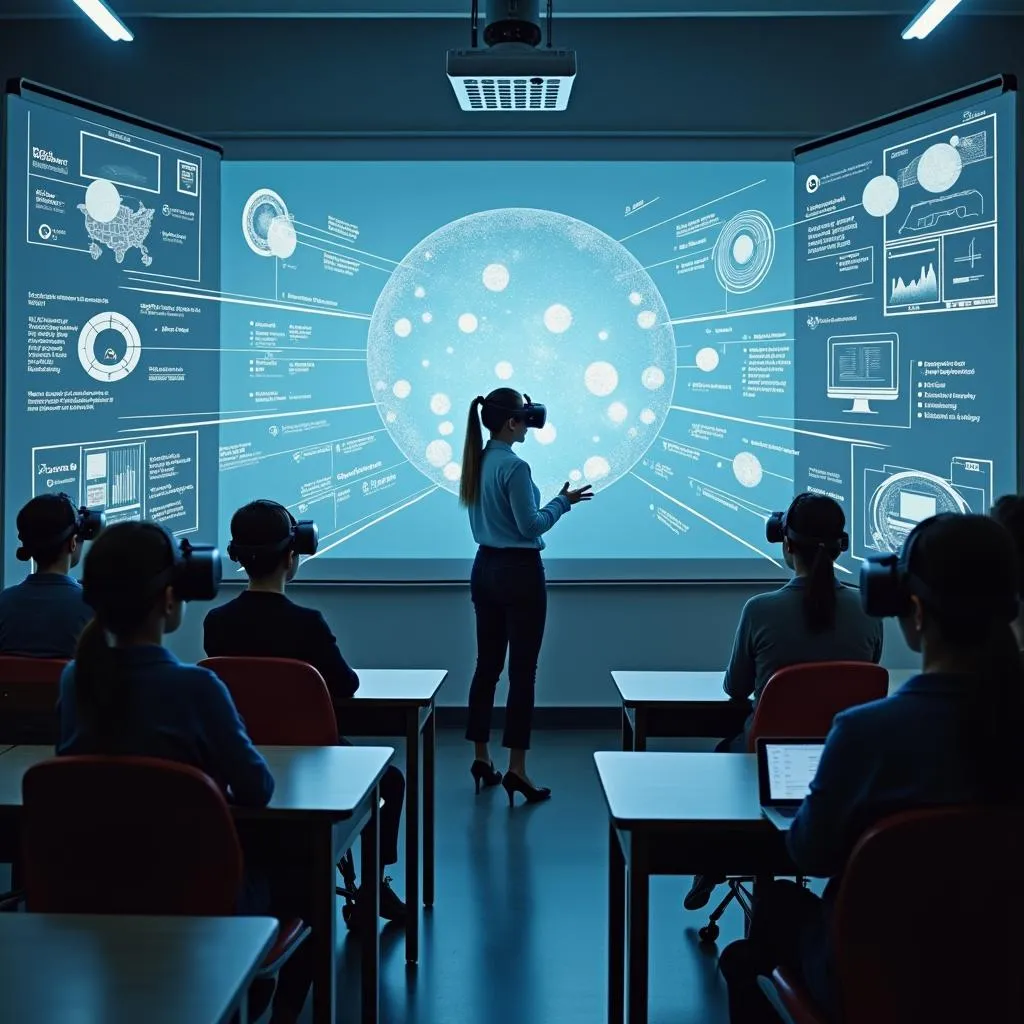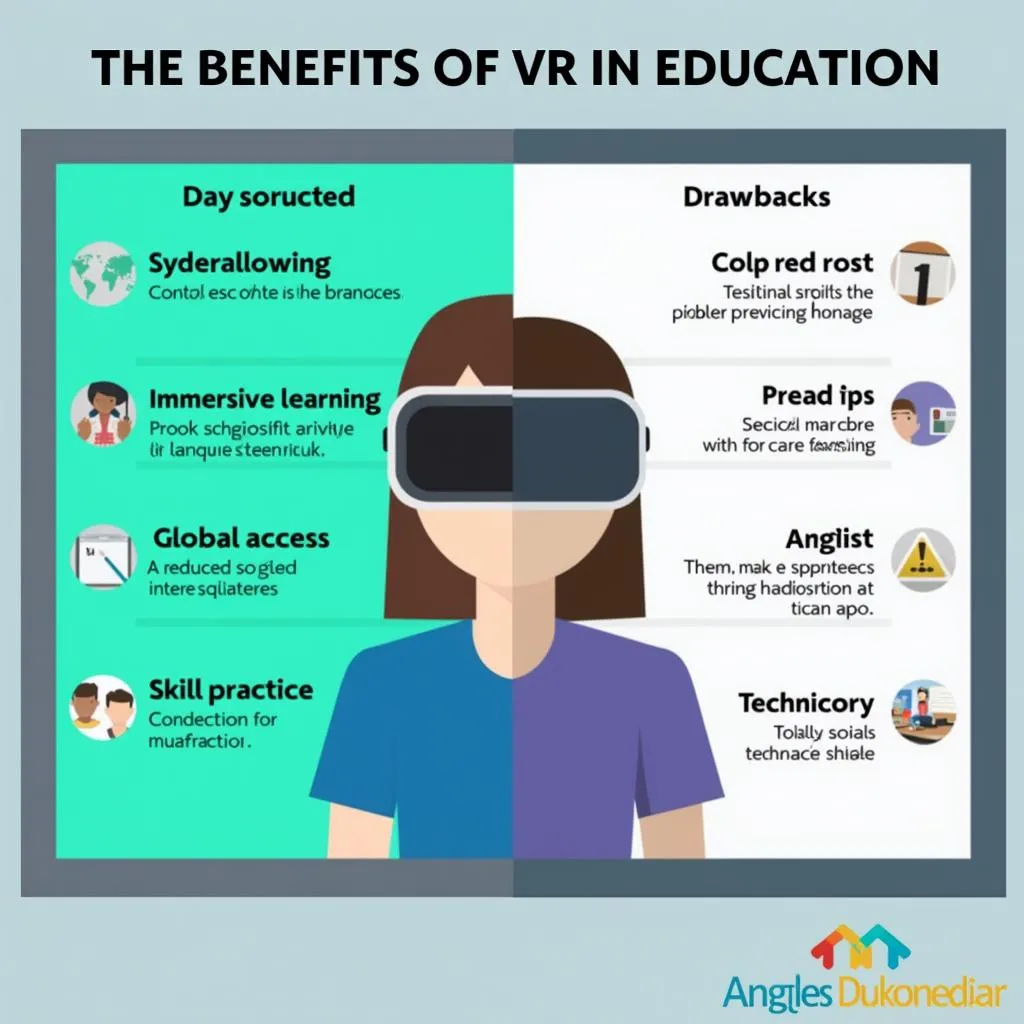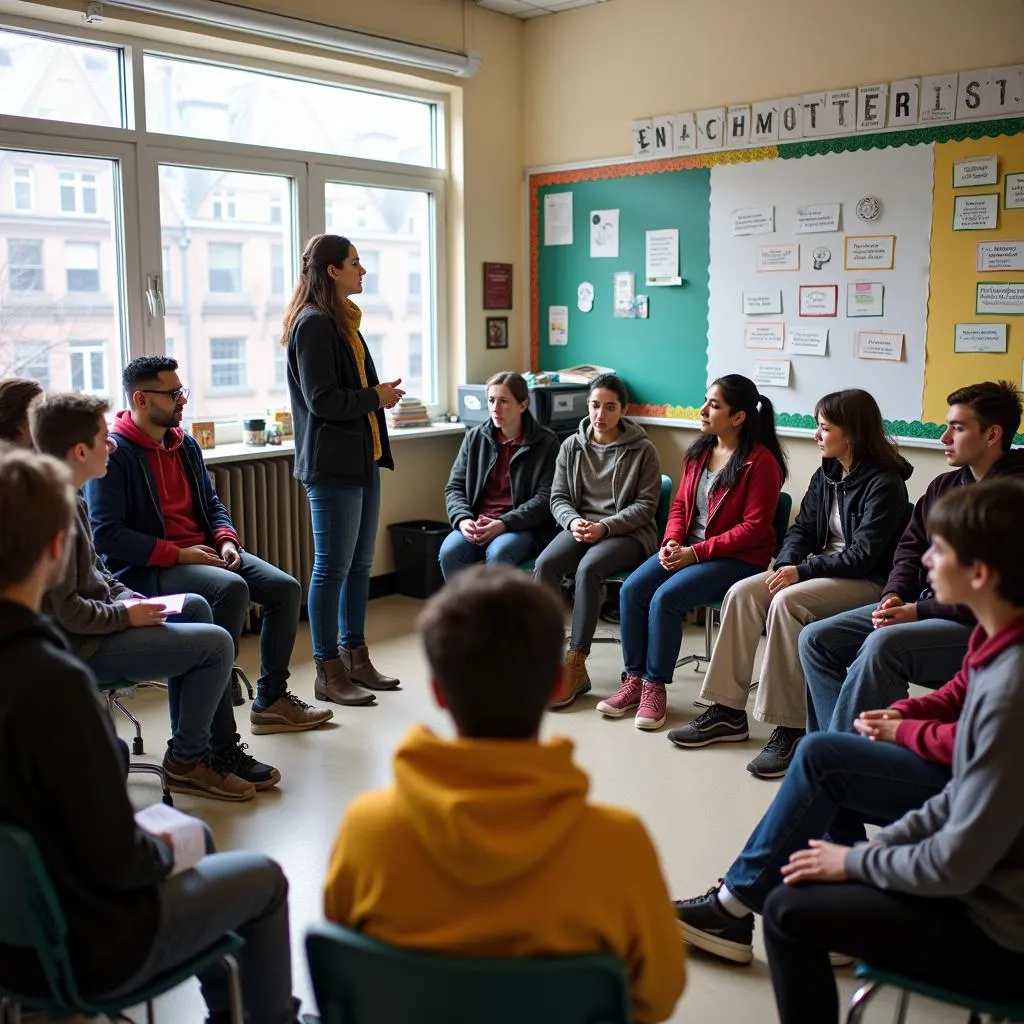Virtual reality (VR) in education has become an increasingly popular topic in IELTS Writing Task 2 essays. This technological advancement is reshaping traditional classroom education, making it a relevant and thought-provoking subject for test-takers. Based on recent trends, we can expect to see more questions related to VR and its impact on education in future IELTS exams. Let’s explore a sample question and analyze high-scoring responses to help you prepare for this topic.
Nội dung bài viết
Some people think that virtual reality technology will have a positive impact on traditional classroom education. To what extent do you agree or disagree?
Analyzing the Question
This question asks for your opinion on the impact of virtual reality technology on traditional classroom education. To answer effectively, you should:
- Clearly state your position (agree, disagree, or partially agree)
- Provide reasons and examples to support your viewpoint
- Consider potential counterarguments
- Conclude by restating your main points
Now, let’s examine sample essays for different band scores.
Sample Essay 1 (Band 8-9)
Virtual reality (VR) technology has emerged as a groundbreaking tool in various fields, including education. While some argue that VR will positively impact traditional classroom education, I largely agree with this perspective, albeit with some reservations.
The integration of VR into classrooms offers numerous advantages. Firstly, it provides immersive learning experiences that were previously impossible. For instance, history students can virtually explore ancient civilizations, while biology students can take a tour inside the human body. This level of engagement enhances understanding and retention of complex concepts. Moreover, VR can cater to different learning styles, making education more inclusive and effective for a diverse student population.
Furthermore, VR technology can bridge geographical barriers in education. Students from remote areas can access high-quality educational resources and experiences that were once limited to well-funded institutions. This democratization of education can lead to more equitable learning opportunities globally.
However, it is crucial to acknowledge potential drawbacks. Overreliance on VR might lead to reduced face-to-face interactions, potentially impacting students’ social skills development. Additionally, the high cost of implementing VR systems could exacerbate existing inequalities between well-funded and underfunded schools.
In conclusion, while VR technology offers significant benefits to traditional classroom education, its implementation should be balanced with traditional teaching methods. A hybrid approach that combines the immersive experiences of VR with the irreplaceable human element of traditional teaching is likely to yield the best educational outcomes.
(Word count: 275)
 Virtual reality enhancing traditional classroom education
Virtual reality enhancing traditional classroom education
Sample Essay 2 (Band 6-7)
Virtual reality (VR) technology is becoming more popular in many areas, including education. I agree that it will have a positive impact on traditional classroom education for several reasons.
Firstly, VR can make learning more interesting and fun for students. For example, instead of just reading about historical events in textbooks, students can use VR to experience them firsthand. This can help them understand and remember information better. Also, VR can help students learn practical skills in a safe environment, like medical students practicing surgeries without risking real patients.
Secondly, VR can provide access to educational experiences that might not be possible otherwise. Students in rural areas or developing countries could visit famous museums or landmarks virtually, giving them opportunities they might never have in real life. This can make education more equal for everyone.
However, there are some potential problems with using VR in classrooms. It can be expensive to buy and maintain VR equipment, which might be difficult for many schools. Also, if students spend too much time in virtual environments, it might affect their social skills or physical health.
In conclusion, I believe that VR will mostly have a positive impact on traditional classroom education. It can make learning more engaging and accessible, but schools should use it carefully alongside other teaching methods to ensure a balanced education.
(Word count: 234)
The role of technology in modern classrooms is evolving rapidly, with virtual reality being one of the most exciting developments. However, it’s important to consider how this technology can be integrated effectively into existing educational frameworks.
Explaining the Scoring
Band 8-9 Essay Analysis
This essay demonstrates excellent writing skills and a sophisticated approach to the topic:
- Clear position: The writer agrees with the statement while acknowledging potential drawbacks.
- Well-developed ideas: Each paragraph focuses on a specific point, supported by relevant examples.
- Cohesion and coherence: Ideas flow logically, with appropriate linking words and phrases.
- Vocabulary: A wide range of vocabulary is used accurately and effectively (e.g., “immersive learning experiences,” “democratization of education”).
- Grammar: Complex sentence structures are used with a high degree of accuracy.
Band 6-7 Essay Analysis
This essay shows good writing skills but lacks some of the sophistication of the higher band essay:
- Clear position: The writer’s opinion is stated clearly.
- Adequate development: Ideas are supported with examples, but they could be more detailed.
- Coherence: The essay has a clear structure, but transitions between ideas could be smoother.
- Vocabulary: Good use of topic-specific vocabulary, but less varied than the Band 8-9 essay.
- Grammar: Generally accurate, with some complex structures, but less varied than the higher band essay.
 Advantages and disadvantages of VR in education
Advantages and disadvantages of VR in education
Key Vocabulary to Remember
- Virtual reality (VR) (noun) – /ˈvɜːrtʃuəl riˈæləti/ – computer-generated simulation of a three-dimensional environment
- Immersive (adjective) – /ɪˈmɜːrsɪv/ – providing, involving, or characterized by deep absorption or immersion in something
- Democratization (noun) – /dɪˌmɒkrətaɪˈzeɪʃən/ – the action of making something accessible to everyone
- Inequalities (noun) – /ˌɪnɪˈkwɒlətiz/ – differences in size, degree, circumstances, etc.
- Integration (noun) – /ˌɪntɪˈɡreɪʃən/ – the action or process of combining two or more things in an effective way
- Exacerbate (verb) – /ɪɡˈzæsərbeɪt/ – make (a problem, bad situation, or negative feeling) worse
- Inclusive (adjective) – /ɪnˈkluːsɪv/ – not excluding any section of society or any party involved in something
- Retention (noun) – /rɪˈtenʃən/ – the continued possession, use, or control of something
- Overreliance (noun) – /ˌəʊvərɪˈlaɪəns/ – excessive dependence on or trust in someone or something
- Hybrid (adjective) – /ˈhaɪbrɪd/ – a thing made by combining two different elements
Adapting education for the digital age requires a careful consideration of these new technologies and their potential impact on learning outcomes.
Conclusion
The integration of virtual reality into traditional classroom education is a complex and evolving topic that is likely to appear in future IELTS Writing Task 2 questions. To prepare, practice writing essays on related themes such as:
- The role of technology in personalized learning
- Balancing digital and traditional teaching methods
- The impact of VR on student engagement and motivation
- Addressing the digital divide in education
Remember to support your arguments with specific examples and consider multiple perspectives on the issue. How online learning is transforming education can provide additional insights into this rapidly changing field.
We encourage you to practice writing your own essay on this topic and share it in the comments section below. This active practice is an excellent way to improve your writing skills and prepare for the IELTS exam. Good luck with your preparation!


